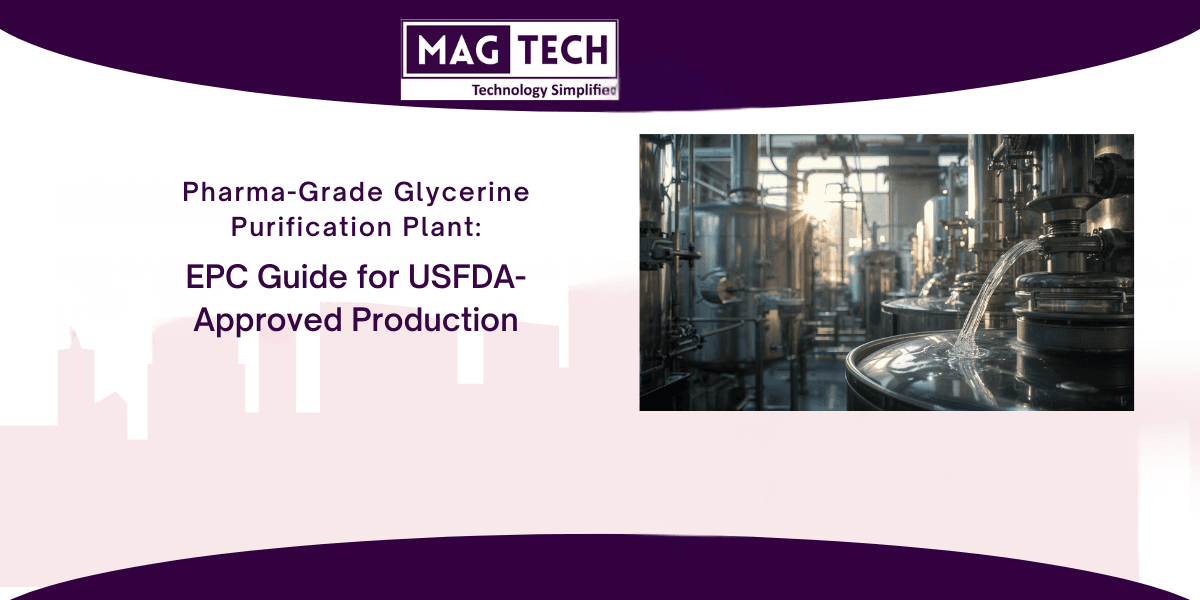A small-scale biodiesel manufacturing unit requires a list of approvals and licenses issued by the governing authorities. The biodiesel small plant will also need a constant feedstock flow like used cooking oils (UCO), restaurant greases, damaged grains, non-edible oils, etc.
First of all, typically, the expense of accumulating these feedstocks accounts for 70% of the entire establishment cost. Additionally, let us take a quick look into the primary requirements of establishing a small biodiesel plant.
First of all, typically, the expense of accumulating these feedstocks accounts for 70% of the entire establishment cost. Additionally, let us take a quick look into the primary requirements of establishing a small biodiesel plant.
Table of Contents
TogglePrepare a Feasibility Report for a Biodiesel Small Plant :
A feasibility study for a biodiesel small plant checks whether the proposed project is viable and practical or not. It helps determine if the project is worth the time and resources and can attract investors and secure financing. The feasibility study evaluates several areas: technical, financial, market, operational, and legal feasibility.
- Technical Feasibility: This assessment examines if the plant can be built and operated using available technology. It considers the types of equipment needed, the technology for converting raw materials into biodiesel, and the plant’s production capacity.
- Financial Feasibility: This involves analyzing the cost of setting up and running the plant against the potential revenue. It includes the costs of raw materials, labor, maintenance, and overheads, and the expected income from selling biodiesel.
- Market Feasibility: Identifying the target market and assessing its demand is crucial. This part of the study examines the potential customers for biodiesel, current market trends, and competition.
- Operational Feasibility: This evaluates the operational aspects of the plant, including site selection, supply chain logistics, and day-to-day operations. It ensures that the plant can operate efficiently and meet production targets.
- Legal Feasibility: This involves understanding and complying with regulatory requirements. It includes necessary permits and licenses that adhere to environmental regulations and legal standards.
The steps to conduct this study are:
1. Preliminary Analysis: This involves an initial assessment to determine if the project is worth pursuing.
2. Projected Income Statement: Preparing a financial projection report covering the future income and expense estimation.
3. Market Research: Conducting surveys and research to understand market demand and competition.
4. Business Organization and Operations Planning: Outlining the organizational structure and operational processes.
5. Opening Day Balance Sheet: Preparing an initial financial statement to understand the financial position at the start.
6. Review and Analysis: Analyzing all collected data to make informed decisions.
Moreover, a comprehensive feasibility study considers market demand, raw material availability, competition, regulatory requirements, and financial forecasts. Additionally, this thorough assessment helps in planning and securing the necessary resources for the successful establishment of the plant.
Site Selection Factors to Consider for a Biodiesel Small Plant :
Here is a brief of how a site is selected for establishing a biodiesel small plant.
- Proximity to Feedstock Sources: The plant should be close to sources of raw materials, such as vegetable oils or animal fats. This minimizes transportation costs and ensures a steady supply of feedstock.
- Transportation Infrastructure: Access to major roads, railways, or ports is crucial for the transportation of raw materials to the plant and biodiesel to the market. Good infrastructure reduces logistics costs and improves supply chain efficiency.
- Access to Utilities: The site must have reliable access to essential utilities such as water, electricity, and natural gas. These are critical for the production process and overall operation of the plant.
- Zoning Regulations: It’s important to select a site that complies with local zoning laws. The area must be zoned for industrial use. It is vital to check for any restrictions or special requirements that could affect the plant’s operation.
- Environmental Considerations: The site should meet environmental regulations to minimize the impact on the surrounding area. This includes managing emissions, waste disposal, and ensuring the plant does not adversely affect local ecosystems.
- Potential for Future Expansion: As the business grows, the plant may need to expand. Choosing a site with additional land available for future expansion can save costs and time in the long run.
Licenses Required for a Small Biodiesel Plant :
After preparing a feasibility report and selecting a site, a biodiesel small plant establishment requires the following licenses and permissions from the regulatory authorities.
Factory License –
To obtain a factory license for a biodiesel small plant, several documents are required. The Factory Act, of 1948 defines a factory as a place where ten or more workers (with power) or 20 or more workers (without power) are employed in a manufacturing process. Here’s a detailed list of the required documents:
- ID Proof of Occupier and Manager: This includes valid identification for both the occupier and the manager of the factory.
- List of Partners and Directors: A document detailing the names and residential addresses of all partners and directors.
- NOC from Board Resolution: A No Objection Certificate (NOC) from a board resolution by directors, nominating the occupier according to Sections 2(n) and 7 of the Factories Act, 1948.
- Proof of Occupier’s Status: Documentation proving the occupier is a director, partner, or proprietor of the factory.
- Building Plan: A detailed plan of the factory building, showing the layout and design.
- Electricity Bill: The latest electricity bill is proof of the sanctioned load of electricity for the factory.
- Proof of Occupancy: Documents such as a copy of the rent agreement or ownership proof (e.g., conveyance deed) showing the occupier’s legal right to use the premises.
- Flow Chart of Manufacturing Process: A clear flow chart depicting the steps involved in the manufacturing process.
- List of Raw Materials: A comprehensive list of all raw materials used in the manufacturing process.
- List of Machinery: Details of all machinery installed on the premises, including their specifications and functions.
- Additional Requirements: Any other particulars as required by the Chief Inspector or Director (ISH).
These documents ensure compliance with legal and safety standards, enabling smooth operation of the biodiesel plant.
Explosive License
The Petroleum and Explosive Safety Organization (PESO) oversees the safety measures for petroleum, explosives, and compressed gases in India. PESO approval is necessary for establishing a biodiesel small plant. This ensures hazardous materials are handled safely, preventing accidents and environmental harm.
The process for obtaining PESO certification includes:
- Preparing the Application Document: Gather and fill out all necessary paperwork.
- Type Approval Tests: Conduct tests for certain goods to ensure they meet safety standards.
- Factory Audit: An inspection for specific items, like pressure vessels, to verify safety compliance.
- Document Review: PESO reviews all submitted documents for accuracy and completeness.
- Issuance of the PESO Certificate: Once approved, PESO issues the certification.
For storing combustible fuel like biodiesel, you need an explosive license from the Directorate of Explosive. Here’s what you need for the application:
1. Filling application form: Collect and complete the required form with proper details.
2. Title document or NOC of the owner: Proof of ownership or a No Objection Certificate from the owner.
3. Site plan: A detailed plan of the site where the fuel will be stored.
4. Survey plan: A survey of the area to ensure safety and compliance.
5. NOC of the local body: Approval from the local governing body.
6. Trade license/house tax receipt: Proof of business operation or property tax payment.
7. Passport-size photographs of the applicant: Recent photos for identification purposes.
Additionally, PESO certification ensures that the handling and storage of hazardous materials comply with Indian laws and regulations. As a result, this prevents accidents and ensures environmental safety.
Essential Approvals Required for a Biodiesel Small Plant
Consent to Establish (CTE)
To obtain Consent to Establish (CTE) for a biodiesel plant, you need to provide several key documents. Here’s a detailed list:
1. Fill out the application form: Gather the respective form and fill it with proper information.
2. Signed undertaking: A signed declaration stating compliance with regulations.
3. Land documents: Include rent or lease agreements to prove land use rights.
4. Site plan or layout: A detailed map of the site layout.
5. Industry registration proof: Documentation showing the registration of the industry.
6. Detailed project report: This should include the total investment made in the project.
7. Process and waste details: Provide information on processes and sources of effluent discharge, air emission, solid waste, and hazardous waste generated.
8. Machinery and capital list: List the machinery used in the unit, along with details on capital investments in land, buildings, and plant machinery
9. Water balance and source: Outline the water balance, source of water, and the quantity required.
Additionally, these documents ensure that the biodiesel plant meets environmental and safety standards. Furthermore, providing complete and accurate information helps in obtaining the necessary CTE approval efficiently.
Consent to Operate (CTO)
To obtain Consent to Operate (CTO) for a biodiesel plant, you need to submit the following documents:
1.Fill out the application form: Check the required information needed to fill out the application form.
2. Balance sheet certified by a CA: Provide a certified balance sheet from a Chartered Accountant.
3. Copy of CTE: Submit a copy of the Consent to Establish (CTE).
4. Pollution control measures: Details of water and air pollution control measures implemented.
5. Land documents: Include copies of land-related documents such as lease or ownership proof.
6. Consent fee: Pay the applicable consent fee.
7. Laboratory analysis report: Submit reports of laboratory analysis for effluent and air emissions.
8. Environment clearance: Provide an environment clearance document, if applicable.
These documents ensure that the small biodiesel plant will comply with environmental regulations and safety standards. Accurate and complete submission helps in the smooth approval process for the CTO.
Environmental Clearance :
To obtain environmental clearance for a biodiesel plant, you need the following:
1. Environmental Impact Assessment (EIA) report: A detailed report assessing the potential environmental impacts of the project.
2. Project report: A comprehensive project report with details of the plant’s operations, raw materials, and production processes.
3. Public hearing: Records of the public hearing conducted to address concerns from the local community.
4. No Objection Certificates (NOCs): NOCs from local authorities and stakeholders.
5. Site plan: A detailed layout of the plant site.
6. Consent to Establish (CTE): A copy of the CTE from the pollution control board.
Takeaway: Follow a Step-by-step Plan for Biodiesel Small Plant Establishment :
Following a step-by-step plan is mandatory for the smooth government approval of your biodiesel small plant establishment. Get the latest information regarding the rules and documents for quick approval. Meet all the regulatory standards and safety requirements for smooth operations.
MagTech: The Best Biodiesel Small Plant Setup Assistance-
First of all, ready to establish your biodiesel plant? Trust MagTech for expert planning and support. Additionally, from feasibility studies to securing licenses and clearances, we guide you every step of the way. In addition, contact us to learn more about how to get government approvals for a biodiesel small plant. Lastly, let us give you the best solution to make your dream come true.


